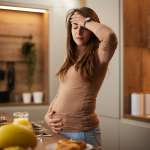I Drank Before I Knew I Was Pregnant – Is My Baby Okay?

If you drank alcohol before realizing you were pregnant, you may be worried about the effect it could have on your baby.
When I first found out I was pregnant, I was overjoyed. Then, a scary thought hit me–I had just had a few (err–more than a few) drinks the weekend before.
A few doctors claim that a glass of wine here and there won’t hurt, but the general rule is clear: no drinking alcohol when you are pregnant. But what about before you even know you're pregnant?
For me, I did the only thing I could think to do. I scheduled an emergency appointment with my obstetrician-gynecologist. Thankfully, his words were soothing, “Don’t worry, this happens all the time. Before a missed period, there’s nothing you can do that will either hurt or help a pregnancy along.”
I felt a sigh of relief, but couldn’t help but wonder–why doesn’t alcohol hurt a brand-new pregnancy?
Can I Drink Alcohol in Early Pregnancy?
Pregnancy is calculated in weeks, starting on the first day of your last period. This is because the date of ovulation and conception are very hard for a healthcare provider to pinpoint. Conversely, the signs of menstruation are much easier to spot. Thus, healthcare providers count the week of your period as week one. In fact, you won’t actually conceive your baby until week two or three, depending on the length of your cycle.
Are Pregnancy Migraines Linked to Miscarriages and Other Complications?
Women are far more likely than men to suffer migraine headaches and the frequency of getting migraines tends to increase during a woman’s childbearing years. Research has found that some women who experience migraines during pregnancy may be at a higher risk for miscarriage and other pregnancy complications. Read More
By the time your period is actually due, it will be around four weeks of pregnancy. Since many people won't even take a pregnancy test until they actually miss that period, they won’t find out that they are pregnant until they’re well into the fourth or fifth week.
When Does Implantation Occur?
It is important to remember that the placenta does not develop until the end of your first month. This is one of the main reasons why you are technically pregnant for closer to 10 months when counting in terms of four-week increments.

People tend to ovulate about halfway through those first four weeks of pregnancy. For most, conception occurs about 14 days after their last period started. However, this is not the moment that you become pregnant. How is that possible? If the fertilized egg does not implant, the pregnancy is void. Implantation during pregnancy can take up to another eight days to occur following conception.
The Development of the Placenta
According to Kara Manglani, CNM, and author of the blog TheFertileTimes.com, if people consume alcohol during those first few weeks, there is likely no effect on the pregnancy. “That’s because the placenta doesn’t develop until after the first missed period,” she says. “During this time any food or alcohol a woman consumes is not passed to the baby.”
The placenta is an organ that provides oxygen and nutrients to your growing child. But, before week five or six, it’s simply a ball of cells. At conception (when the sperm meets the egg), the cells begin dividing rapidly. Then, as the fertilized egg implants into the uterus, some of those cells start to form the placenta, while others begin to form the embryo. By the eighth week, the developing embryo is called a fetus and the placenta is fully formed and functioning, ready to provide nutrients to the embryo.
In short, don’t panic if you had a few too many alcoholic drinks before you found out that you were pregnant. Instead, stop drinking the moment that you discover your big news and immediately begin taking your prenatal vitamin. Then, set up an appointment with your doctor or midwife, and rest assured that your little one is probably doing just fine.
The Amount of Alcohol Matters
Manglani warns that women should avoid binge drinking when trying to get pregnant. Not only is binge drinking bad for your overall health, but it also directly affects fertility by inhibiting ovulation and implantation. That doesn’t mean that you can’t enjoy a few drinks if you’re trying to get pregnant, but the amount of alcohol matters.
Binge drinking is defined as consuming enough spirits to bring your blood alcohol level to 0.08%, or having about four or more drinks in about two hours, according to the CDC.[1] Therefore, a glass of wine after work doesn’t come close.
Your Body's Natural Defense Mechanism
Interestingly enough, your body has a natural defense mechanism in place to keep you from ingesting alcohol and other toxins once they can actually start affecting your baby. It’s called morning sickness, and for many, it happens more than just in the morning. “Once the first missed period occurs, nausea sets in to encourage women to avoid potential toxins, such as alcohol,” says Manglani.
Once you’re in the throes of morning sickness, you won’t want to be in the same room as a strong drink. Looking at it as nature’s way to keep your baby safe is an interesting new take on this otherwise very unpleasant symptom.
Can I Drink Alcohol in My Second and Third Trimesters?
Just like with the first trimester, alcohol use should be avoided in the second and third trimesters of pregnancy as well. In Weeks 13 through 26 of pregnancy, your baby will be forming muscles and major organs like the liver, kidneys, and lungs. They will also start to gain weight and grow in length.
Alcohol can hinder all of these developments. It can also trigger preterm labor. What you may not realize is that it is those last few weeks of pregnancy when your sweet little one really starts to pack on the pounds. This weight gain is vital to their temperature regulation, adjustment to feeding, and their ability to ward off infections after birth. Thus, the longer your baby stays safely inside of you, the better off they will be in the long run.
Official Guidance on Drinking Alcohol While Pregnant
The official statement from the Centers For Disease Control and Preventions states that "there is no known safe amount of alcohol use during pregnancy or while trying to get pregnant. There is also no safe time for alcohol use during pregnancy. All types of alcohol are equally harmful, including all wines and beer."
How Does Alcohol Affect an Embryo or Developing Baby?
According to the National Institute on Alcohol Abuse and Alcoholism, "Prenatal alcohol exposure is a leading preventable cause of birth defects and neurodevelopmental abnormalities in the United States. It can cause a range of developmental, cognitive, and behavioral problems, which can appear at any time during childhood and last a lifetime."[2]
Two of the main conditions that your child can develop are Fetal Alcohol Syndrome (FAS) and Fetal Alcohol Spectrum Disorders (FASD). The Centers For Disease Control And Prevention note that these congenital conditions can lead to learning disabilities, struggles with attention and memory, communication delays, and an array of other symptoms.[3]
Research also indicates that alcohol use in the first trimester can cause facial abnormalities, low birth weight, and "may increase the risk of miscarriage, stillbirth, preterm delivery, and sudden infant death syndrome."[4]
What Does the Latest Research Say?
Research carried out over the last decade all points to the same conclusion that the CDC reports – alcohol is never safe during any stage of pregnancy. However, unlike normal research, these studies are based on self-reported information. It would be unethical to conduct controlled experiments on pregnant people in order to determine the impacts of alcohol exposure on an unborn baby.
Thus, there are likely many people who drank a bottle of wine in the days leading up to their positive pregnancy test who have gone on to have perfectly healthy children. However, these individuals may have been less likely to have reported their drinking since there were no detrimental impacts. Therefore, this data is not recorded in the research.
It’s best to avoid consuming any level of alcohol once you find out that you are pregnant. It is also important to try and cut back on your alcohol consumption while trying to conceive and to pay attention to your body and your cycle. This can help you to stop drinking sooner. Nonetheless, your baby is likely okay if you accidentally drank during early pregnancy.
What To Do if You’re Still Concerned
Recent surveys show that 45% of all pregnancies in the United States are unplanned.[5] Since most pregnancy tests do not work until at least a week following implantation, there is no possible way you could have known this information unless you were attempting to conceive. Try to remember that it’s not your fault.
Next, talk to your healthcare provider about any concerns that you may have and the steps you should take moving forward. If you engage in heavy drinking, it is imperative that you address interventions that you can take and possible symptoms of withdrawal to watch out for. This can help to ensure that you remain sober during this crucial time frame.
Drinking Before I Knew I Was Pregnant
Discovering you consumed alcohol before realizing you were pregnant can be a moment fraught with anxiety and guilt. However, it's crucial to focus on moving forward by adopting healthy lifestyle choices and seeking guidance from healthcare professionals. Early pregnancy involves critical development stages, yet the body has remarkable ways of protecting a developing fetus.
If you find yourself in this situation, remember: you're not alone, and support is available. Prioritize prenatal care, maintain open lines of communication with your healthcare provider, and take each step one day at a time. Your proactive approach from this point forward is what's most important for you and your baby's well-being.


